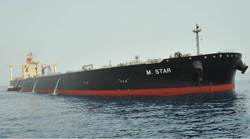 Reuters: Iran’s vital seaborne trade is suffering from escalating sanctions pressure as shipping companies scale down activities or pull out, with the Islamic Republic facing more hurdles in transporting its oil, trade and shipping sources say.
Reuters: Iran’s vital seaborne trade is suffering from escalating sanctions pressure as shipping companies scale down activities or pull out, with the Islamic Republic facing more hurdles in transporting its oil, trade and shipping sources say.
By Jonathan Saul
 LONDON, Dec 1 (Reuters) – Iran’s vital seaborne trade is suffering from escalating sanctions pressure as shipping companies scale down activities or pull out, with the Islamic Republic facing more hurdles in transporting its oil, trade and shipping sources say.
LONDON, Dec 1 (Reuters) – Iran’s vital seaborne trade is suffering from escalating sanctions pressure as shipping companies scale down activities or pull out, with the Islamic Republic facing more hurdles in transporting its oil, trade and shipping sources say.
The European Union tightened its sanctions against Tehran on Thursday and laid out plans for a possible embargo on Iranian oil in response to mounting concerns in the West over the OPEC producer’s nuclear work.
Last week the United States, Canada and Britain announced measures against Iran’s energy and financial sectors.
“The further sanctions imposed by U.S., UK and Canada will make it even more difficult for Iranian companies to do business because their options to use the international banking system will be reduced,” said Jakob Larsen, maritime security officer with BIMCO, the world’s largest private shipowners’ association.
“Obviously this will also affect an international trade such as shipping.”
Much of Iran’s imported needs including food and consumer goods are transported by sea via container ships. Oil tankers are used to ferry the country’s crude oil exports.
“Most (shipping) transactions used to be done in dollars but they can’t trade in dollars which is a difficulty in itself. The chances are that banks involved in trade finance will have large scale U.S. operations which is yet another restriction,” a shipping source said. “It’s getting tougher and tougher for them now.”
One of the biggest problems facing shipping companies is how to identify parties with whom it is still permissible to trade without breaching international sanctions.
“The EU and the U.S. in particular have provided little guidance as to how their regulations should be interpreted,” said Michelle Linderman, a partner with law firm Ince & Co LLP.
Jens Martin Jensen, chief executive of Frontline, the world’s largest independent tanker operator, said it did not have any dealings with Iran at the moment.
“We are not even allowed to pay agents in Iran, so that is something we definitely don’t do,” he told Reuters.
The latest sanctions aim to step up heat on Iran over its nuclear programme which it says is for peaceful purposes.
BLACKLIST
In June, the United States blacklisted major Iranian port operator Tidewater Middle East Co, which operates seven terminals in Iran including Bandar Abbas.
“From an Iranian point of view, Bandar Abbas is very important because it will be the main point of entry for container cargoes,” said Jan Tiedemann, shipping analyst with consultancy Alphaliner.
The U.S. move led the world’s top container player Maersk Line to suspend operations at several Iranian ports including Bandar Abbas.
German container shipping group Hapag-Lloyd said it did not accept cargo for Bandar Abbas nor any consignments for other Tidewater-run ports. It said the smaller container port of Bushehr, some 900 km north of Bandar Abbas, was not managed by Tidewater.
“We have moved only a few containers through Bushehr by feeder vessels which are not our own vessels. We do not have an own service calling there,” a spokeswoman said.
Hapag-Lloyd’s previous Bandar Abbas service had been jointly operated with South Korea’s Hyundai Merchant Marine. A source familiar with the matter said Hyundai had reduced its shipping service to Iran and was closely monitoring the situation.
“Hyundai’s vessels, however, en route via Bandar Abbas do not contain any refinery or nuclear-related products since those items are blacklisted,” the source said.
CMA CGM, the world’s third-largest container shipping group, stopped exports from Iran in July and since September has been scanning all containers bound for Iran from the UAE.
Danish shipping and oil group A.P. Moller-Maersk , which owns Maersk Line, said it was still engaged in business with Iran including the transport of provisions, natural gas and crude oil as well as bunker fuel supply to Maersk-related vessels, in compliance with sanctions.
“The group has and continues to update a comprehensive compliance program involving all relevant foreign trade controls,” it said.
There was growing worry that Iran’s shipping trade with Dubai was also being squeezed.
“Exports and imports via ports in the UAE have been vital to maintaining trade links to the outside world. Sanctions targeting the Iranian shipping industry have taken their toll however,” said Alan Fraser with security firm AKE.
Iranian shipping companies have also found themselves in the firing line especially the Islamic Republic of Iran Shipping Lines (IRISL), which has faced targeted sanctions for several months. IRISL has denied it was engaged in any illegal activity.
Separately, Iran’s biggest tanker operator NITC said in June it had secured ship insurance cover mainly in Asia and also in Iran after European providers pulled out due to sanctions. The group has not been targeted by sanctions. An NITC official declined to comment when contacted. (Additional reporting by Ju-min Park in Seoul and Joachim Dagenbourg in Oslo, editing by William Hardy)


